This document is the table of contents for an introduction to philosophy reader from 2017-18. It lists 13 chapters covering major works and thinkers in the history of philosophy, including Plato, Aristotle, Descartes, Locke, Schopenhauer, James, Mill, Anselm of Canterbury, and Thomas Aquinas. The first entry provides an excerpt from Plato's "Allegory of the Cave," describing prisoners chained in a cave seeing only shadows on the wall and the process of being released and seeing true forms in the light outside the cave.
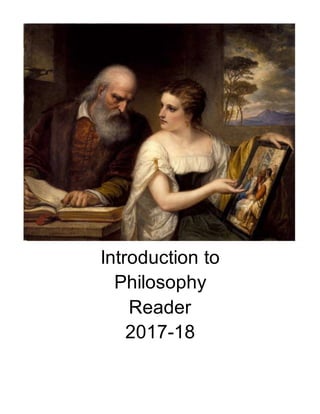

![1.
Plato’s
The Allegory of the Cave
And now, I said, let me show in a figure [of speech] how far our nature is enlightened or unenlightened:—Behold! Human
beings living in a underground den, which has a mouth open towards the light and reaching all along the den; here they
have been from their childhood, and have their legs and necks chained so that they cannot move, and can only see
before them, being prevented by the chains from turning round their heads. Above and behind them a fire is blazing at a
distance, and between the fire and the prisoners there is a raised way; and you will see, if you look, a low wall built along
the way, like the screen which marionette players have in front of them, over which they show the puppets.
I see.
And do you see, I said, men passing along the wall carrying all sorts of vessels, and statues and figures of animals made
of wood and stone and various materials, which appear over the wall? Some of them are talking, others silent.
You have shown me a strange image, and they are strange prisoners.
Like ourselves, I replied; and they see only their own shadows, or the shadows of one another, which the fire throws on
the opposite wall of the cave?
True, he said; how could they see anything but the shadows if they were never allowed to move their heads?
And of the objects which are being carried in like manner they would only see the shadows?
Yes, he said.
And if they were able to converse with one another, would they not suppose that they were naming what was actually
before them?
Very true.
And suppose further that the prison had an echo which came from the other side, would they not be sure to fancy when
one of the passers-by spoke that the voice which they heard came from the passing shadow?
No question, he replied.
To them, I said, the truth would be literally nothing but the shadows of the images.
That is certain.
And now look again, and see what will naturally follow if the prisoners are released and disabused of their error. At first,
when any of them is liberated and compelled suddenly to stand up and turn his neck round and walk and look towards the
light, he will suffer sharp pains; the glare will distress him, and he will be unable to see the realities of which in his former
state he had seen the shadows; and then conceive someone saying to him, that what he saw before was an illusion, but
that now, when he is approaching nearer to being and his eye is turned towards more real existence, he has a clearer](https://image.slidesharecdn.com/kemdmjodrimpfxff7idc-signature-e90806c90ef6eaff8a2ae5ab92d896a0340e13f9ee56c16a02e25e56d9da9896-poli-180923201043/85/Introduction-to-philosophy-reader-17-18-3-320.jpg)
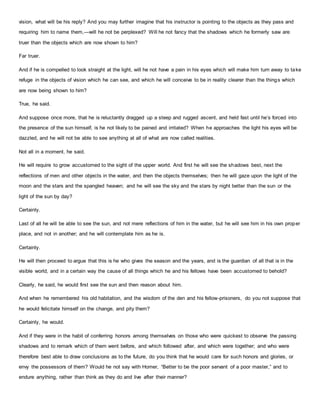
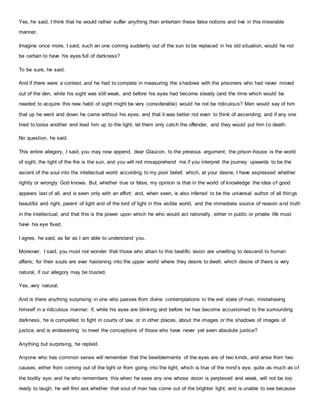

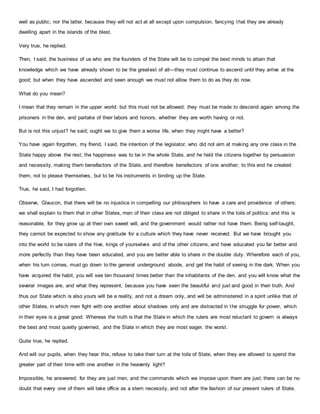

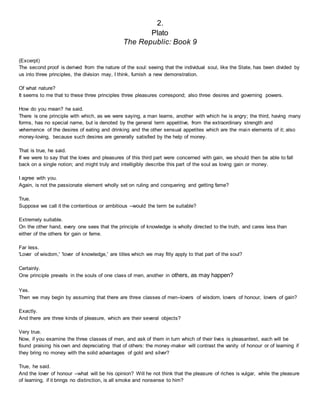


![3.
The Republic: Book 10
PLATO’S FORMS
“Listen, then, or rather, answer my question.”
“Ask it,” he said.
“Could you tell me in general what imitation is? For neither do I myself quite apprehend what it would
be at.”
“It is likely, then,10” he said, “that I should apprehend!”
“It would be nothing strange,” said I, “since it often happens [596a] that the dimmer vision sees
things in advance of the keener.11”
“That is so,” he said; “but in your presence I could not even be eager to try to state anything that
appears to me, but do you yourself consider it. Shall we, then, start the inquiry at this point by our
customary procedure12? We are in the habit, I take it, of positing a single idea or form13 in the case of
the various multiplicities to which we give the same name. Do you not understand?”
“I do.”
“In the present case, then, let us take any multiplicity you please; [596b] for example, there are many
couches and tables.”
“Of course.”
“But these utensils imply, I suppose, only two ideas or forms, one of a couch and one of a table.”
“Yes.”
“And are we not also in the habit of saying that the craftsman who produces either of them fixes his
eyes14 on the idea or form, and so makes in the one case the couches and in the other the tables that
we use, and similarly of other things? For surely no craftsman makes the idea itself. How could he?”
“By no means.”
“And in what way,19
I ask you,” he said.
“But now consider [596c] what name you would give to this craftsman.”
“What one?”
“Him who makes all the things15 that all handicraftsmen severally produce.”
“A truly clever and wondrous man you tell of.”
“Ah, but wait,16 and you will say so indeed, for this same handicraftsman is not only able to make all
implements, but he produces all plants and animals, including himself,17 and thereto earth and
heaven and the gods and all things in heaven and in Hades under the earth.”
“A most marvellous sophist,18“ [596d] he said.](https://image.slidesharecdn.com/kemdmjodrimpfxff7idc-signature-e90806c90ef6eaff8a2ae5ab92d896a0340e13f9ee56c16a02e25e56d9da9896-poli-180923201043/85/Introduction-to-philosophy-reader-17-18-12-320.jpg)
![“Are you incredulous?” said I. “Tell me, do you deny altogether the possibility of such a craftsman, or
do you admit that in a sense there could be such a creator of all these things, and in another sense
not? Or do you not perceive that you yourself would be able to make all these things in a way?”
“There is no difficulty,” said I, “but it is something that the craftsman can make everywhere and
quickly. You could do it most quickly if you should choose to take a mirror and carry it about
everywhere. [596e] You will speedily produce the sun and all the things in the sky, and speedily the
earth and yourself and the other animals and implements and plants and all the objects of which we
just now spoke.”
“Yes,” he said, “the appearance of them, but not the reality and the truth.”
“Excellent,” said I, “and you come to the aid of the argument opportunely. For I take it that the painter
too belongs to this class of producers, does he not?”
“Of course.”
“But you will say, I suppose, that his creations are not real and true. And yet, after a fashion, the
painter20 too makes a couch, does he not?”
“Yes,” he said, “the appearance of one, he too.” [597a]
“What of the cabinet-maker? Were you not just now saying that he does not make the idea or form
which we say is the real couch, the couch in itself,21 but only some particular couch?”
“Yes, I was.”
“Then if he does not make that which really is, he could not be said to make real being but something
that resembles real being but is not that. But if anyone should say that being in the complete sense22
belongs to the work of the cabinet-maker or to that of any other handicraftsman, it seems that he
would say what is not true.”
“That would be the view,” he said, “of those who are versed23 in this kind of reasoning.” “We must not
be surprised, then, if this too is only a dim adumbration in comparison with reality.” [597b]
“No, we must not.”
“Shall we, then, use these very examples in our quest for the true nature of this imitator?”
“If you please,” he said.
“We get, then, these three couches, one, that in nature24 which, I take it, we would say that God
produces,25 or who else?”
“No one, I think.”
“And then there was one which the carpenter made.”
“Yes,” he said.
“And one which the painter. Is not that so?”
“So be it.”](https://image.slidesharecdn.com/kemdmjodrimpfxff7idc-signature-e90806c90ef6eaff8a2ae5ab92d896a0340e13f9ee56c16a02e25e56d9da9896-poli-180923201043/85/Introduction-to-philosophy-reader-17-18-13-320.jpg)
![“The painter, then, the cabinet-maker, and God, there are these three presiding over three kinds of
couches.”
“Yes,three.” [597c]
“Now God,whether because he so willed or because some compulsion was laid upon him26 not to
make more than one couch in nature, so wrought and created one only,27 the couch which really and
in itself is. But two or more such were never created by God and never will come into being.”
“How so?” he said.
“Because,” said I, “if he should make only two, there would again appear one of which they both
would possess the form or idea, and that would be the couch that really is in and of itself, and not the
other two.”
“Right,” he said.
“God, then, I take it, knowing this and wishing [597d] to be the real author of the couch that has real
being and not of some particular couch, nor yet a particular cabinet-maker, produced it in nature
unique.”
“So it seems.”
“Shall we, then, call him its true and natural begetter, or something of the kind?”
“That would certainly be right,” he said, “since it is by and in nature28 that he has made this and all
other things.”
“And what of the carpenter? Shall we not call him the creator of a couch?”
“Yes.”
“Shall we also say that the painter is the creator and maker of that sort of thing?”
“By no means.”
“What will you say he is in relation to the couch?” [597e]
“This,” said he, “seems to me the most reasonable designation for him, that he is the imitator of the
thing which those others produce.”
“Very good,” said I; “the producer of the product three removes29 from nature you call the imitator?”
“By all means,” he said.
“This, then, will apply to the maker of tragedies also, if he is an imitator and is in his nature three
removes from the king and the truth, as are all other imitators.”
“It would seem so.”
“We are in agreement, then, about the imitator. [598a] But tell me now this about the painter. Do you
think that what he tries to imitate is in each case that thing itself in nature or the works of the
craftsmen?”
“The works of the craftsmen,” he said.
“Is it the reality of them or the appearance? Define that further point.30”](https://image.slidesharecdn.com/kemdmjodrimpfxff7idc-signature-e90806c90ef6eaff8a2ae5ab92d896a0340e13f9ee56c16a02e25e56d9da9896-poli-180923201043/85/Introduction-to-philosophy-reader-17-18-14-320.jpg)
![“What do you mean?” he said.
“This: Does a couch differ from itself according as you view it from the side or the front or in any other
way? Or does it differ not at all in fact though it appears different, and so of other things?”
“That is the way of it,” he said: “it appears other but differs not at all.” [598b]
“Consider, then, this very point. To which is painting directed in every case, to the imitation of reality
as it is31 or of appearance as it appears? Is it an imitation of a phantasm or of the truth?”
“Of a phantasm,32” he said.
“Then the mimetic art is far removed33 from truth, and this, it seems, is the reason why it can produce
everything, because it touches or lays hold of only a small part of the object and that a phantom34; as,
for example, a painter, we say, will paint us a cobbler, a carpenter, and other craftsmen, [598c]
though he himself has no expertness in any of these arts,35 but nevertheless if he were a good
painter, by exhibiting at a distance his picture of a carpenter he would deceive children and foolish
men,36 and make them believe it to be a real carpenter.”](https://image.slidesharecdn.com/kemdmjodrimpfxff7idc-signature-e90806c90ef6eaff8a2ae5ab92d896a0340e13f9ee56c16a02e25e56d9da9896-poli-180923201043/85/Introduction-to-philosophy-reader-17-18-15-320.jpg)






![6.
Rene Descartes
First and Second Meditation
First Meditation:
On what can be called into doubt
Some years ago I was struck by how many false things I had believed, and by how doubtful was the structure of beliefs
that I had based on them. I realized that if I wanted to establish anything in the sciences that was stable and likely to las t, I
needed—just once in my life—to demolish everything completely and start again from the foundations. It looked like an
enormous task, and I decided to wait until I was old enough to be sure that there was nothing to be gained from putting it
off any longer. I have now delayed it for so long that I have no excuse for going on planning to do it rather than getting to
work. So today I have set all my worries aside and arranged for myself a clear stretch of free time. I am here quite alone,
and at last I will devote myself, sincerely and without holding back, to demolishing my opinions.
I can do this without showing that all my beliefs are false, which is probably more than I could ever manage. My
reason tells me that as well as withholding assent from propositions that are obviously •false, I should also withhold it from
ones that are •not completely certain and indubitable. So all I need, for the purpose of rejecting all my opinions, is to find
in each of them at least some reason for doubt. I can do this without going through them one by one, which would take
forever: once the foundations of a building have been undermined, the rest collapses of its own accord; so I will go
straight for the basic principles on which all my former beliefs rested.
Whatever I have accepted until now as most true has come to me through my senses. But occasionally I have
found that they have deceived me, and it is unwise to trust completely those who have deceived us even once. [The next
paragraph presents a series of considerations back and forth. It is set out here as a discussion between two people, but
that isn’t how Descartes presented it.]
Hopeful: Yet although the senses sometimes deceive us about objects that are very small or distant, that doesn’t
apply to my belief that I am here, sitting by the fire, wearing a winter dressing-gown, holding this piece of paper in my
hands, and so on. It seems to be quite impossible to doubt beliefs like these, which come from the senses. Another
example: how can I doubt that these hands or this whole body are mine? To doubt such things I would have to liken
myself to brain-damaged madmen who are convinced they are kings when really they are paupers, or say they are
dressed in purple when they are naked, or that they are pumpkins, or made of glass. Such people are insane, and I would
be thought equally mad if I modelled myself on them.
Doubtful (sarcastically): What a brilliant piece of reasoning! As if I were not a man who sleeps at night and often
has all the same experiences while asleep as madmen do when awake—indeed sometimes even more improbable ones.
Often in my dreams I am convinced of just such familiar events— that I am sitting by the fire in my dressing-gown—when
in fact I am lying undressed in bed!
Hopeful: Yet right now my eyes are certainly wide open when I look at this piece of paper; I shake my head and it
isn’t asleep; when I rub one hand against the other, I do it deliberately and know what I am doing. This wouldn’t all happen
with such clarity to someone asleep.
Doubtful: Indeed! As if I didn’t remember other occasions when I have been tricked by exactly similar thoughts
while asleep! As I think about this more carefully, I realize that there is never any reliable way of distinguishing being](https://image.slidesharecdn.com/kemdmjodrimpfxff7idc-signature-e90806c90ef6eaff8a2ae5ab92d896a0340e13f9ee56c16a02e25e56d9da9896-poli-180923201043/85/Introduction-to-philosophy-reader-17-18-22-320.jpg)
![awake from being asleep. This discovery makes me feel dizzy, [joke:] which itself reinforces the notion that I may be
asleep!
Suppose then that I am dreaming—it isn’t true that I, with my eyes open, am moving my head and stretching out
my hands. Suppose, indeed that I don’t even have hands or any body at all. Still, it has to be admitted that the visions that
come in sleep are like paintings: they must have been made as copies of real things; so at least these general kinds of
things— eyes, head, hands and the body as a whole—must be real and not imaginary. For even when painters try to
depict sirens and satyrs with the most extraordinary bodies, they simply jumble up the limbs of different kinds of real
animals, rather than inventing natures that are entirely new. If they do succeed in thinking up something completely
fictitious and unreal—not remotely like anything ever seen before—at least the colours used in the picture must be real.
Similarly, although these general kinds of things— eyes, head, hands and so on—could be imaginary, there is no denying
that certain even simpler and more universal kinds of things are real. These are the elements out of which we make all our
mental images of things—the true and also the false ones.
These simpler and more universal kinds include body, and extension; the shape of extended things; their quantity,
size and number; the places things can be in, the time through which they can last, and so on.
So it seems reasonable to conclude that physics, astronomy, medicine, and all other sciences dealing with things
that have complex structures are doubtful; while arithmetic, geometry and other studies of the simplest and most general
things—whether they really exist in nature or not—contain something certain and indubitable. For whether I am awake or
asleep, two plus three makes five, and a square has only four sides. It seems impossible to suspect that such obvious
truths might be false.
However, I have for many years been sure that there is an all-powerful God who made me to be the sort of
creature that I am. How do I know that he hasn’t brought it about that there is no earth, no sky, nothing that takes up
space, no shape, no size, no place, while making sure that all these things appear to me to exist? Anyway, I sometimes
think that others go wrong even when they think they have the most perfect knowledge; so how do I know that I myself
don’t go wrong every time I add two and three or count the sides of a square? Well, ·you might say·, God would not let me
be deceived like that, because he is said to be supremely good. But, ·I reply·, if God’s goodness would stop him from
letting me be deceived •all the time, you would expect it to stop him from allowing me to be deceived even •occasionally;
yet clearly I sometimes am deceived.
Some people would deny the existence of such a powerful God rather than believe that everything else is
uncertain. Let us grant them—for purposes of argument—that there is no God, and theology is fiction. On their view, then,
I am a product of fate or chance or a long chain of causes and effects. But the less powerful they make my original cause,
the more likely it is that I am so imperfect as to be deceived all the time—because deception and error seem to be
imperfections. Having no answer to these arguments, I am driven back to the position that doubts can properly be raised
about any of my former beliefs. I don’t reach this conclusion in a flippant or casual manner, but on the basis of powerful
and well thought-out reasons. So in future, if I want to discover any certainty, I must withhold my assent from these former
beliefs just as carefully as I withhold it from obvious falsehoods.
It isn’t enough merely to have noticed this, though; I must make an effort to remember it. My old familiar opinions
keep coming back, and against my will they capture my belief. It is as though they had a right to a place in my belief-
system as a result of long occupation and the law of custom. These habitual opinions of mine are indeed highly probable;
although they are in a sense doubtful, as I have shown, it is more reasonable to believe than to deny them. But if I go on
viewing them in that light I shall never get out of the habit of confidently assenting to them. To conquer that habit,
therefore, I had better switch right around and pretend (for a while) that these former opinions of mine are utterly false and
imaginary. I shall do this until I have something to counter-balance the weight of old opinion, and the distorting influence of](https://image.slidesharecdn.com/kemdmjodrimpfxff7idc-signature-e90806c90ef6eaff8a2ae5ab92d896a0340e13f9ee56c16a02e25e56d9da9896-poli-180923201043/85/Introduction-to-philosophy-reader-17-18-23-320.jpg)

![am nothing, so long as I shall be conscious that I am something. So that it must, in fine, be maintained, all things
being maturely and carefully considered, that this proposition (pronunciatum) I am, I exist, is necessarily true each
time it is expressed by me, or conceived in my mind.
4. But I do not yet know with sufficient clearness what I am, though assured that I am; and hence, in the next place, I
must take care, lest perchance I inconsiderately substitute some other object in room of what is properly myself, and
thus wander from truth, even in that knowledge (cognition) which I hold to be of all others the most certain and
evident. For this reason, I will now consider anew what I formerly believed myself to be, before I entered on the
present train of thought; and of my previous opinion I will retrench all that can in the least be invalidated by the
grounds of doubt I have adduced, in order that there may at length remain nothing but what is certain and
indubitable.
5. What then did I formerly think I was ? Undoubtedly I judged that I was a man. But what is a man ? Shall I say a
rational animal ? Assuredly not; for it would be necessary forthwith to inquire into what is meant by animal, and what
by rational, and thus, from a single question, I should insensibly glide into others, and these more difficult than the
first; nor do I now possess enough of leisure to warrant me in wasting my time amid subtleties of this sort. I prefer
here to attend to the thoughts that sprung up of themselves in my mind, and were inspired by my own nature alone,
when I applied myself to the consideration of what I was. In the first place, then, I thought that I possessed a
countenance, hands, arms, and all the fabric of members that appears in a corpse, and which I called by the name
of body. It further occurred to me that I was nourished, that I walked, perceived, and thought, and all those actions I
referred to the soul; but what the soul itself was I either did not stay to consider, or, if I did, I imagined that it was
something extremely rare and subtile, like wind, or flame, or ether, spread through my grosser parts. As regarded
the body, I did not even doubt of its nature, but thought I distinctly knew it, and if I had wished to describe it
according to the notions I then entertained, I should have explained myself in this manner: By body I understand all
that can be terminated by a certain figure; that can be comprised in a certain place, and so fill a certain space as
therefrom to exclude every other body; that can be perceived either by touch, sight, hearing, taste, or smell; that can
be moved in different ways, not indeed of itself, but by something foreign to it by which it is touched [and from which
it receives the impression]; for the power of self-motion, as likewise that of perceiving and thinking, I held as by no
means pertaining to the nature of body; on the contrary, I was somewhat astonished to find such faculties existing in
some bodies.
6. But [as to myself, what can I now say that I am], since I suppose there exists an extremely powerful, and, if I may
so speak, malignant being, whose whole endeavors are directed toward deceiving me ? Can I affirm that I possess
any one of all those attributes of which I have lately spoken as belonging to the nature of body ? After attentively
considering them in my own mind, I find none of them that can properly be said to belong to myself. To recount them
were idle and tedious. Let us pass, then, to the attributes of the soul. The first mentioned were the powe rs of
nutrition and walking; but, if it be true that I have no body, it is true likewise that I am capable neither of walking nor
of being nourished. Perception is another attribute of the soul; but perception too is impossible without the body;
besides, I have frequently, during sleep, believed that I perceived objects which I afterward observed I did not in
reality perceive. Thinking is another attribute of the soul; and here I discover what properly belongs to myself. This
alone is inseparable from me. I am—I exist: this is certain; but how often? As often as I think; for perhaps it would
even happen, if I should wholly cease to think, that I should at the same time altogether cease to be. I now admit](https://image.slidesharecdn.com/kemdmjodrimpfxff7idc-signature-e90806c90ef6eaff8a2ae5ab92d896a0340e13f9ee56c16a02e25e56d9da9896-poli-180923201043/85/Introduction-to-philosophy-reader-17-18-25-320.jpg)










